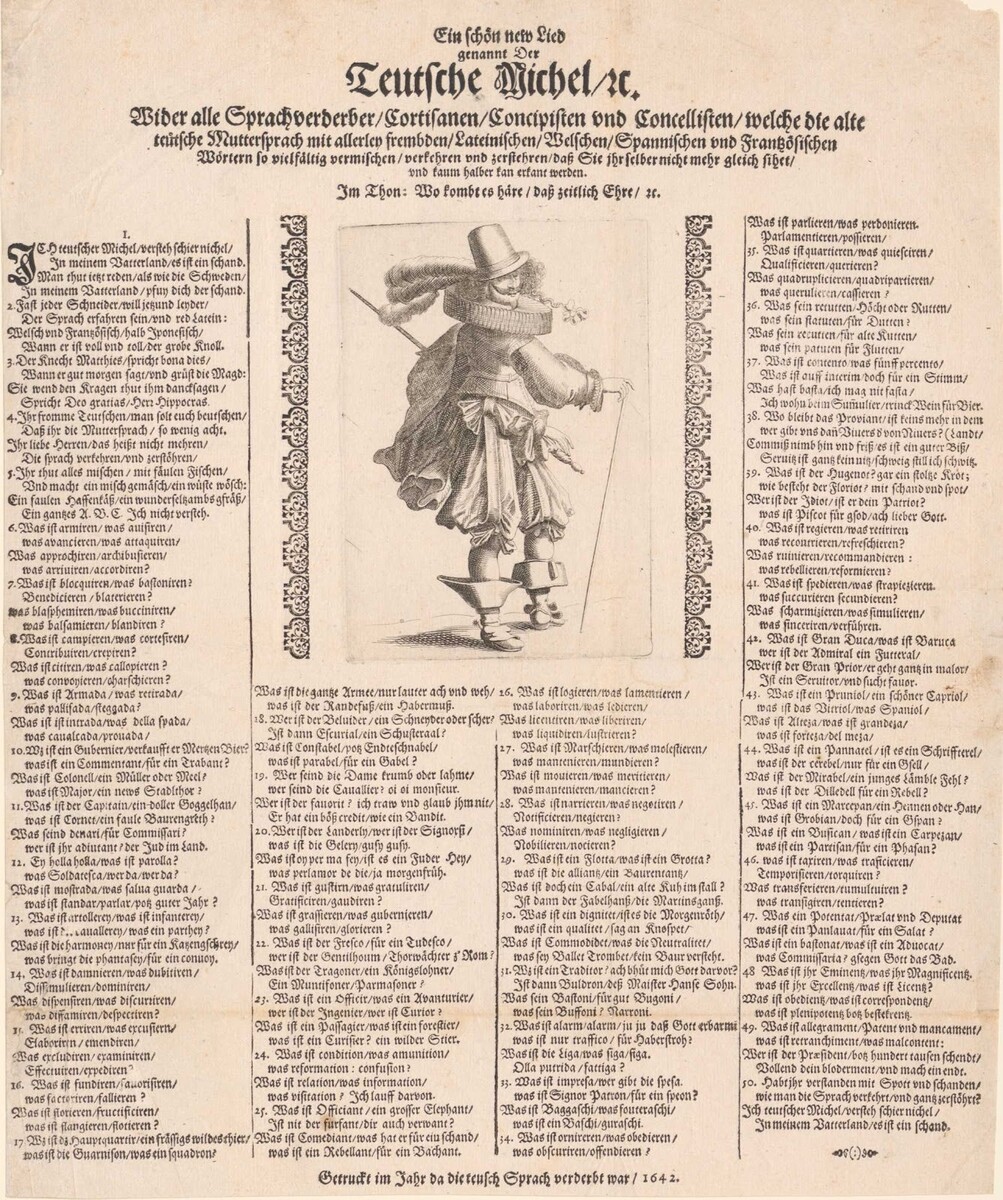The “German Michel” against the Language Spoilers (1642)
Abstract
The “German Michel” is a personification and caricature of the Germans. He is most commonly represented in a positive light as a simple but down-to-earth character. This 1642 broadsheet on the German language portrays the “German Michel” as uneducated and lacking knowledge of foreign languages. The goal here is to criticize the incorporation of foreign words into the German language and to promote the return of an unadulterated German.
Source
A fine new song
1. I, German Michel (“Mick”) / understand not a lick /
2. Now every tailor aspires / to talk like a squire /
3. “Bona dies” / quoth the farmhand Matthias /
4. Ye God-fearing Almains / deserve a taste of the cane /
5. You make a mélange / a wretched hodge-podge
6. What is arming / What is housing
7. What is blocking / What is basting?
8. What is camping / what is courting /
[ . . . ]
22. Was is a fresco / for a Tedesco?
23. What is an officer / what an adventurer?
24. What is a condition? What is ammunition?
25. What is an officiant / a large elephant /
[ . . . ]
48. What is Your Eminence / what is Your Magnificence?
49. What is allegrament / Patent und mancament /
50. Is it now clear to you all / how with scorn and scandal
Translation: Deborah Cohen

called The German Michel / etc.
Against all language spoilers / courtesans / concipients and concellists / who admix / abrogate and annihilate the ancient German mother tongue with all manner of foreign / Latin / Italian / Spanish and French words, so that they can themselves no longer see it / and it is scarcely recognizable.
In tone: Whence does it come / that timely honor / etc.
In this, my home-place / it is a disgrace.
Folks now converse / Like they’re Swedish, or worse /
In my home-place / oh, what an ignominious disgrace!
And can be heard chattin’ / in French, Italian or Latin:
When he’s drunk as a lord, the ignorant gourd,
Walking on his knees / might sound half Japanese.
When he bids a good day / to the maid pitching hay:
She straightens her snood, expresses her gratitude
With the words “deo gratias, Mr. Hippocras.”
For your inattention / To your mother tongue.
That means, gentlemen / you should henceforth refrain
From perverting the tongue / and destroying the same.
A mish-mash mash-mish / with moldering fish:
A foul potpourri / a salmagundi
A whole A.B.C. It’s all Greek to me.
What advancing / what attacking
What approaching / blunderbussing
What is divining / synchronizing?
benedicting / what is plating
What blaspheming / what buccaneering
What is embalming / blandishing?
contributing/ deceasing?
Was is citing / what galloping?
what convoying/ charging?
Who is the gentilhomme / the gatekeeper of Rome?
What is a dragoon? A kingsman?
A muntifoner / A Parmasoner?
Who is an engineer? Who is a courier?
What is a passenger? What is a forester?
What is a cuirassier? A wild steer?
What is reformation: confusion?
What is relation / what is information/
What is visitation? Hell and damnation!
Is not the charlatan / also your kinsman?
What is a comedian / Is he deviant?
What kind of devil is a rebel?
What is excellence / What is license?
What is obedience? What is correspondence?
What is plenipotence? Does it even make sense?
what is retranchiment / what malcontent
Who is the president / I can’t hide my contempt /
Complete your descent / And bring it to an end.
Our tongue is perverted / and wholly massacred
I, German Michel (“Mick”) / understand not a lick
In my home-place / it is a disgrace.
Source: Ein schön new Lied genannt Der Teutsche Michel, etc. Wider alle Sprachverderber, Cortisanen, Concipisten und Concellisten, welche die alte teutsche Muttersprach mit allerley frembden, Lateinischen, Welschen, Spannischen und Frantzösischen Wörtern ..., Im Thon: Wo kombt es häre, daß zeitlich Ehre, etc. [S.l.], 1642. BSB-Einblatt-ID: BSBEinblB135085683. Available online at: http://daten.digitale-sammlungen.de/bsb00031778/image_1
Bavarian State Library